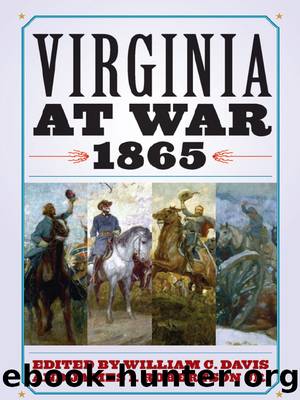Virginia at War, 1865 by William C. Davis

Author:William C. Davis
Language: eng
Format: epub
Publisher: The University Press of Kentucky
Published: 2011-03-15T00:00:00+00:00
Notes
1. Richmond Times, April 25, 1865; Lucy Mae Turner, âThe Family of Nat Turner, 1831 to 1954,â Negro History Bulletin 18 (March 1955): 131.
2. Charles L. Perdue Jr., Thomas E. Barden, and Robert K. Phillips, Weevils in the Wheat: Interviews with Virginia Ex-Slaves (Charlottesville: University of Virginia Press, 1976), 128; âSlavery Chainâ folder, âVirginia Negro Lore,â box A6888, Records of the U.S. Works Project Administration, Library of Congress, Washington, D.C.; mass meeting, âHallâs Hill Va. [Falls Church] August 4th 1865,â in Steven Hahn, Steven F. Miller, Susan E. OâDonovan, John C. Rodrigue, and Leslie S. Rowland, eds., Land and Labor, 1865, series 3, vol. 1 of Freedom: A Documentary History of Emancipation, 1861â1867 (Chapel Hill: University of North Carolina Press, 2008), 699. See also Liberator, February 24, 1865, 30; and Ervin L. Jordan Jr., Black Confederates and Afro-Yankees in Civil War Virginia (Charlottesville: University of Virginia Press, 1995), 305.
3. âFrom Committee of Richmond Blacks,â June 10, 1865, in Andrew Johnson, The Papers of Andrew Johnson, 16 vols., ed. Leroy Graf (Knoxville: University of Tennessee Press, 1986), 8:211â12; Annette Gordon-Reed, The Hemingses of Monticello: An American Family (New York: Norton, 2008), 719n52.
4. Martha W. Robertson Diary, January 22, 1865, p. 59, accession 36339, Library of Virginia, Richmond (hereafter cited as LVA) (âgloomyâ quote); Clara Shafer Civil War Diary, January 10 and February 12, 1865, accession 12456, Special Collections Library, University of Virginia, Charlottesville (hereafter cited as UVA) (food hoarding); Daniel E. Sutherland, Seasons of War: The Ordeal of a Confederate Community, 1861â1865 (New York: Free Press, 1995), 372, 375, 447n3, 447n9 (Nalle quote); John A. Campbell, âMemoranda of the Conversation at the Conference in Hampton Roads,â p. 5 of 9, and âMemoranda of the Conversation at the Conference in Hampton Roads,â p. 4 of 8 (both February 1865), in folder â1865 March 13 Memorandum of Lincoln-Stephens Conference at Hampton Roads,â box 33, Papers of the Hunter and Garnett Families, accession 38â45, UVA; Keith W. Jennison, The Humorous Mr. Lincoln (New York: Bonanza Books, 1965), 133â34; Lerone Bennett Jr., Forced into Glory: Abraham Lincolnâs White Dream (Chicago: Johnson, 2000), 611â15; Carl Sandburg, Abraham Lincoln: The Prairie Years and the War Years (New York: Harcourt, Brace, 1954), 652â53 (Seward quote). For examples of Lincoln and white Northerners as racist would-be emancipators, see Bennett, Forced into Glory, 14, 48, 138, 344, 364, 375, 472.
5. Charlottesville Daily Chronicle, January 1, 1865, advertisements: âBlacksmiths, Mechanics and Laborers Wanted,â âOne Hundred Able Bodied Negro Men,â âTwo Valuable Families of Negroes at Auctionâ and âFor Hireâ (slave woman with small children); bill of sale for the slave Jefree, February 10, 1865, accession 13747, UVA; Michael G. Harman (Staunton, Virginia) to Davis, January 12, 1865, in Jefferson Davis, The Papers of Jefferson Davis, vol. 11, September 1864âMay 1865, ed. Lynda Lasswell Crist, Barbara J. Rozek, and Kenneth H. Williams (Baton Rouge: Louisiana State University Press, 2003), 314â15. Harman was a colonel of the Fifty-second Virginia Infantry, Stauntonâs quartermaster, and a member of the Virginia Military Instituteâs board of visitors. Robert J.
Download
This site does not store any files on its server. We only index and link to content provided by other sites. Please contact the content providers to delete copyright contents if any and email us, we'll remove relevant links or contents immediately.
| United States | Abolition |
| Campaigns & Battlefields | Confederacy |
| Naval Operations | Regimental Histories |
| Women |
In Cold Blood by Truman Capote(2702)
Steve Jobs by Walter Isaacson(2459)
All the President's Men by Carl Bernstein & Bob Woodward(1971)
Lonely Planet New York City by Lonely Planet(1857)
The Murder of Marilyn Monroe by Jay Margolis(1751)
The Room Where It Happened by John Bolton;(1729)
The Poisoner's Handbook by Deborah Blum(1671)
And the Band Played On by Randy Shilts(1632)
Lincoln by David Herbert Donald(1622)
The Innovators by Walter Isaacson(1612)
A Colony in a Nation by Chris Hayes(1530)
The Innovators: How a Group of Hackers, Geniuses, and Geeks Created the Digital Revolution by Walter Isaacson(1519)
Under the Banner of Heaven: A Story of Violent Faith by Jon Krakauer(1425)
The Unsettlers by Mark Sundeen(1347)
Amelia Earhart by Doris L. Rich(1345)
Birdmen by Lawrence Goldstone(1345)
Decision Points by George W. Bush(1261)
Dirt by Bill Buford(1247)
Zeitoun by Dave Eggers(1231)
